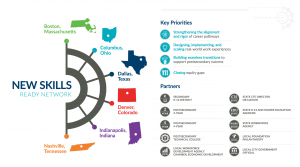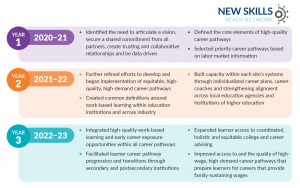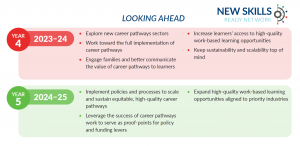
Advance CTE and Education Strategy Group (ESG) recently released an annual report and site snapshots for year three of the New Skills ready network initiative. The five-year initiative, part of JPMorgan Chase’s $350 million global New Skills at Work program and $30 billion commitment to advance racial equity, aims to improve student completion of high-quality, equitable career pathways to gain skills needed for the future of work, particularly among learners of color and other historically marginalized learners.
As a partner in the New Skills ready network initiative, Advance CTE elevates the successes and lessons learned across the six sites as they work towards the implementation of high-quality, equitable career pathways. Over the course of the three years of the initiative, sites have made significant progress in the development and implementation of career pathways from defining the core elements of high-quality career pathways to improving the access and equity of high-quality career pathways. The policy and programmatic changes adopted across the six sites in the initiative are promising approaches and strategies that can be leveraged in other states and areas to enhance the design, delivery and implementation of high-quality, equitable career pathways.

Throughout year three of the New Skills ready network initiative, several key priorities emerged as trends for the six sites:
- Integrating high-quality work-based learning and early career exposure opportunities within all career pathways;
- Facilitating learner career pathway progression and transition through secondary and postsecondary institutions;
- Expanding learner access to coordinated, holistic, equitable college and career advising; and
- Improving access to and the quality of high-wage, high-demand career pathways that prepare learners for careers with family-sustaining wages.
Across each key priority area, sites have leveraged cross-sector networks and partnerships to deploy promising practices that support their sites with the successful development and implementation of high-quality career pathways that meet the needs of learners and industry. Examples of achievement across the sites include the Columbus, Ohio, site leveraging an employer toolkit, created by the Ohio Department of Education, to help industry partners better understand the opportunities and challenges associated with work-based learning.
The Indianapolis, Indiana, site expanded learner access to college and career advising by developing resources and supports for learners and finalizing frameworks that align career advising practices. For example, postsecondary partners published program maps for learners participating in agreements between Indiana University-Purdue University Indianapolis and Ivy Tech Community College.
The Nashville, Tennessee, team has supported increased access to career pathways in HVAC and IT by engaging postsecondary partners like the Tennessee College of Applied Technology – Nashville (TCAT-Nashville). The engagement with TCAT-Nashville has increased learner participation and interest in dual enrollment, and the site now has more than 300 learners enrolled in these opportunities.
Sites like Boston, Massachusetts, and Dallas, Texas, are expanding access to career exploration, advising and high-quality career pathways opportunities to middle grades learners. In year three, the Boston, Massachusetts, team expanded the rollout of their My Career and Academic Plan to middle grades learners to better prepare learners for career pathways, dual enrollment and early college experiences. The Dallas, Texas, team is currently designing a cybersecurity career pathway that will connect all partner institutions with learners and provide lab experiences at the University of North Texas – Dallas. Learners in Dallas, Texas, will be exposed to this high-wage, high-demand career pathway as early as middle school with opportunities to earn credentials.
Project team partners in Denver, Colorado, are improving the learner experience when transitioning from secondary to postsecondary institutions. In year three, the site lead, The Attainment Network, supported secondary and postsecondary institutions with solutions to longstanding challenges in learner transitions including lack of data sharing, erroneous dual enrollment rosters and incorrect schedules for learners. The institutions are now leveraging IT automation to ensure each institution has access to timely information on learners’ schedules, enrollments and more.
In addition to diving more into the aforementioned exciting developments, the site snapshots and year three annual report preview the work for year four in the New Skills ready network initiative. Each site has ambitious goals for year four including exploring new pathways sectors, engaging families and learners in the design and implementation of career pathways, sustaining and scaling career pathways as sites near year five of the initiative and more.

Visit Advance CTE’s New Skills ready network series page to read the full annual report and a snapshot of each site’s innovative partnerships and early accomplishments across the four project priorities. Our New Skills ready network collection page provides additional resources for strengthening career pathways.
Haley Wing, Senior Policy Associate

